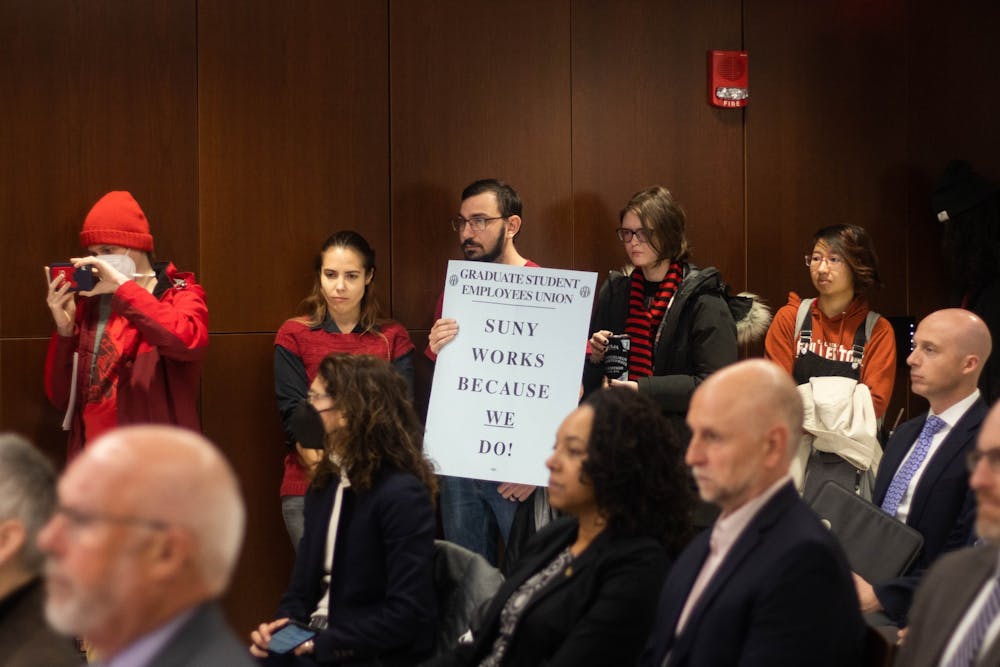UB raised minimum stipends for full-time, fully-funded Ph.D. students to $23,000 following recommendations by the dean of the Graduate School and a stipend review committee, the university announced in a statement Monday.
The minimum stipend was previously set at $20,000, a change made in 2019. The raise will go into effect next fall.
“These increases will ensure that Ph.D. stipends remain competitive and UB programs are able to recruit the very best Ph.D. students to the university,” the statement reads.
Graduate students without guaranteed funding packages have the opportunity to work as graduate assistants (GAs) and teaching assistants (TAs). GAs and TAs work up to 20 hours a week during the academic year and earn a stipend to help defray the costs of their degree, according to a statement from the university. GAs and TAs are also eligible for the same health insurance coverage as full-time SUNY employees.
Members of the Graduate Student Employees Union, the bargaining unit that represents graduate students who work for the university as teaching assistants or graduate assistants, celebrated the announcement while continuing to press for further reforms.
“This is an absolute win — but there’s more to do,” GSEU said in a statement on their website. “We were never asking for a one-time raise for some of us. There are still many graduate workers who are making less than $15,000 per year and still paying fees: this is a yearly income of less than $12,000. GSEU finds this to be utterly unacceptable.”
The announcement was made public the same day that GSEU protested for a $22,000 minimum stipend at Monday’s UB Council meeting. Fifteen grad students marched from One World Café to the council meeting in the Buffalo Room, sporting shirts reading “SUNY works because we do” and signs with slogans like “$22k for all.”
After Council Student Representative A.J. Franklin delivered his report — the last item on the meeting agenda — business agent for GSEU Lawrence Mullen intervened. (Franklin is also an assistant features editor for The Spectrum.) In a prepared speech, they relayed anecdotes of grad students who took on two to three extra jobs, sold plasma and received SNAP benefits to make ends meet. Mullen concluded by asking the council to pass a resolution calling on the university to raise all graduate worker stipends to $22,000 and to eliminate all broad-based fees.
Mullen pressed the council members for a response, adding that “none of this is new information.”
UB Council Chairman Jeremy Jacobs said that the council would consider the resolution. The meeting was immediately adjourned and the GSEU members walked back to their office in The Commons for a debrief.
Provost A. Scott Weber announced the raise in a memo to the deans Nov. 30, and UB publicly announced the change hours before the protest, according to university spokesperson John Della Contrada.
GSEU has been advocating for a $22,000 minimum stipend since November of 2021 while also calling on the university to expand the minimum stipend to all graduate student workers and to eliminate all broad-based fees. The union attributed the 15% raise to graduate workers’ “ceaseless efforts to take the University to task on stagnating wages and continued exploitation of impoverished workers.”
“When a university chooses to pay its graduate workers poverty wages, they actively obstruct any material efforts to attract diverse Ph.D.s,” Mullen said. “Because UB pays $15,000 less than the cost of living in Erie County, programs become accessible to those who only come from generational wealth therefore substantiating a university that actively seeks to block social mobility and racial equity.”
Kiana Hodge is an assistant news/features editor and can be reached at kiana.hodge@ubspectrum.com





